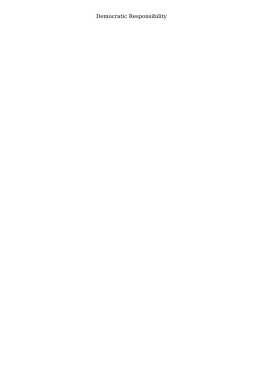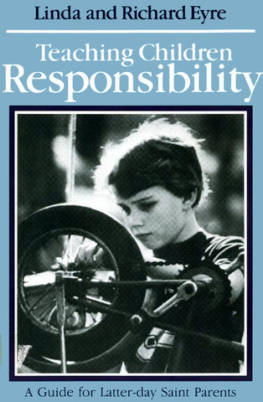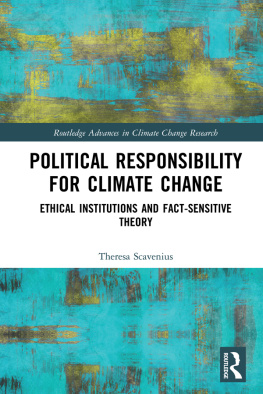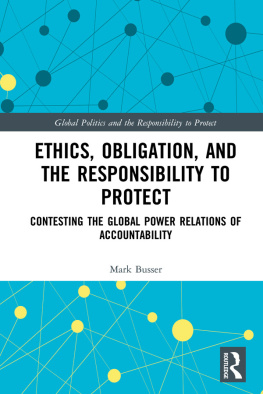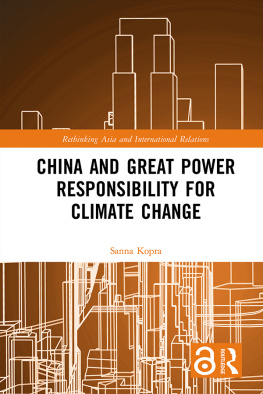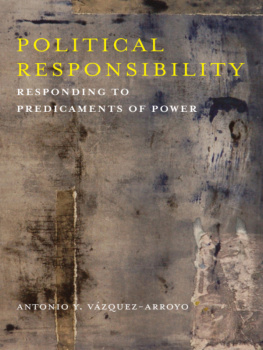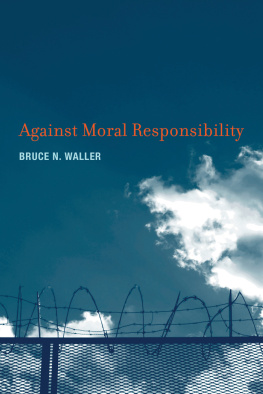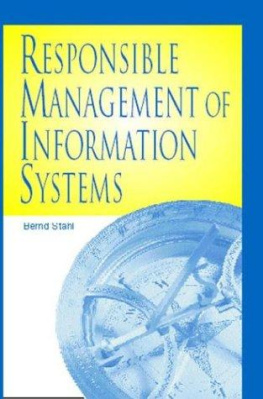PREFACE
I first became interested in responsibility for many hands problems as an undergraduate at Wesleyan University, as I struggled to understand my own complicity in a misguided war started by a leader for whom I (and a majority of my fellow citizens) did not vote. During my years at Wesleyan, Arash Abizadeh, Donald Moon, and Nancy Schwartz not only inspired my growing interest in political theory but also taught me that political theory can be an important resource for thinking about contemporary political ills. David Morgan taught me to sympathetically interpret the behavior of historical actors and also encouraged me to see economic and political outcomes as the result of both individual behaviors and larger structural processes.
As a graduate student, I found Duke Universitys Department of Political Science to be a stimulating and supportive intellectual community. I am grateful to my teachersRom Coles, Peter Euben, Michael Gillespie, Ruth Grant, Malachi Hacohen, and Tom Spragensfor exposing me to such a wide range of methodologies and perspectives on democracy. During my time at Duke, I was inspired and challenged by my fellow graduate students: Ali Aslam, Nazli Avdan, Winter Brown, Harriet Baker, James Bourke, Keegan Callahan, Dominique Dry, Amber Daz Pearson, Stefan Dolgert, Bill English, Laura Grattan, Ben Hertzberg, Alisa Kessel, David McIvor, David Gonzalez Rice, Joel Schlosser, and Nick Troester. Special thanks go to Laura for her professional advice, and to James, David Rice, Joel, and Nick for commenting on very rough drafts. A fellowship from the American Association for University Women funded me during my final year of dissertation writing.
I have benefited immensely from the support of my dissertation committee, which oversaw the project that eventually became this book. From the beginning, Ruth Grant, Michael Gillespie, Mike Lienesch, and Tom Spragens encouraged my unconventional idea of using American thinkersmany of whom are not part of the traditional canonto explore contemporary philosophical debates about responsibility. Each member of my committee went well above the call of duty. The chapter on Jane Addams was inspired by a conversation I had with Ruth during the very early stages of the project. I have learned a great deal from Michael Gillespies Academic Writing Working Group. Michaels advice about writingin particular his advice about how to craft a clear and engaging introductionis always at the back of my mind when I write. His feedback also helped me weave together various threads in early versions of these chapters. Mike Lienesch was crucial in helping me transform this project from a dissertation into a book; he not only gave me the confidence to envision its eventual publication but also read and commented on multiple versions of every chapter. I am also grateful to Mike for pointing me toward Martin Luther King Jr.s early sermons on responsibility, and for more generally sharing his exhaustive knowledge of American political theory and history with me.
Tom was an exemplary dissertation advisor. In his relationship with me, he embodied his own commitment to autonomy, insisting that my dissertation and subsequent writing reflect my own beliefs. Moreover, while Toms commitment to autonomy meant that he never sought to impose his own ideas on my writings, the entire argument of this book rests on his claim that democracy is rooted in multiple, sometimes competing, ideals.
I began revising my dissertation for publication while serving as a postdoctoral fellow at the University of WisconsinMadisons American Democracy Forum. I am grateful to Rick Avramenko, Dan Kapust, and Jimmy Casas Klausen for advice on everything from finding an apartment to communicating with journal editors. John Zumbrunnen was an excellent mentor, who commented on several drafts of the chapter on Jane Addams. I am also grateful to the Jack Miller Center for funding my fellowship.
I finished this book while working at Duke as a visiting assistant professor and program administrator for the American Values and Institutions Program, with financial support from the Thomas W. Smith Foundation. Michael Gillespiethe director of the American Values and Institutions programcontinues to be an excellent mentor. My colleagues, Nolan Bennett and Matt Whitt, offered perceptive comments on multiple versions of this manuscript and probed me to think more clearly about both responsibility and democracy. I have had the privilege to get to know a new generation of Duke graduate students, each of whom has offered useful feedback: Samuel Bagg, Eric Cheng, Chris Kennedy, Antong Liu, Alexandra Oprea, Aaron Roberts, Brian Spisiak, and Isak Tranvik. My undergraduate research assistants, Kari Barclay and Bre Bradham, were also invaluable.
Molly Lyndon Shanley deserves particular thanks for her encouragement and feedback over the years; I particularly appreciate her detailed comments on the penultimate version of the manuscript. Hollie Mann, James Patterson, Justin Rose, Peter Stillman, Jack Turner, and Joel Winkelman also offered valuable feedback at various stages of the writing process.
I have benefited from comments and questions from audiences at the following places: the American Political Science Association Annual Meeting, the Association for Political Theory Annual Meeting, the Kenan Institute for Ethics Monday Seminar Series, the Midwest Political Science Associate Annual Meeting, the University of Wisconsin American Democracy Forum Conference on Popular Sovereignty, and the Western Political Science Association Annual Meeting.
My editor, Steve Wrinn, was a pleasure to work with. Robyn Karkiewicz and Matthew Dowd did an excellent job overseeing the revision and production process. Additionally, I am delighted that my reviewersBob Pepperman Taylor and Lida Maxwellmade themselves known to me so that I can give them the credit they deserve for their thoughtful and helpful comments.
I am grateful to Alden Ferro, Katie Lehman, and Kat Selzter for copyediting assistance and to Ryan Denniston for tracking down primary sources.
Parts of this book draw on a previously published article, Democratizing Responsibility: Jane Addamss Pragmatist Ethics, Polity 45, no. 3 (2013): 34771. My thanks go to the publisher for permission to reuse this material.
Thanks also to Courtney Brown, Russ Damian, Josh Kaye, Heather Mayer, and Stephanie Schaffer for providing both emotional support and welcome distractions. Over the course of the past few years, my colleagues in the Duke Faculty Union have helped me put some of the ideals articulated into practice, and I am profoundly grateful to them.
My parents, Miriam Cohen and Michael Hanagan, have been a constant source of encouragement and inspiration. They not only fostered my own sense of responsibility for processes that are a source of suffering but also provided examples of teacher-scholars who are passionate about social justice. I am grateful to my mom for sharing her knowledge of the Progressive Era, and to my dad for encouraging me to read the American pragmatists. My dad passed away while I was finishing the project, but his commitment to democracy lives on in these pages. I am also thankful for the support of my sister Julia Hanagan, who responds to many hands problems every day in her work as an attorney. My brother-in-law, Nate Verbiscar Brown, is a welcome addition to the family, as is my nephew, Emmet Michael Hanagan-Brown.

